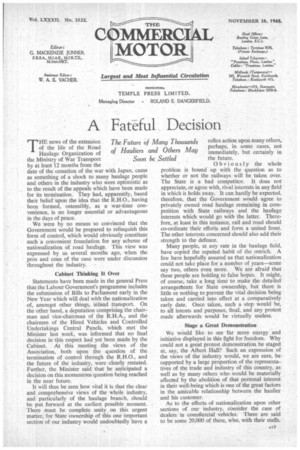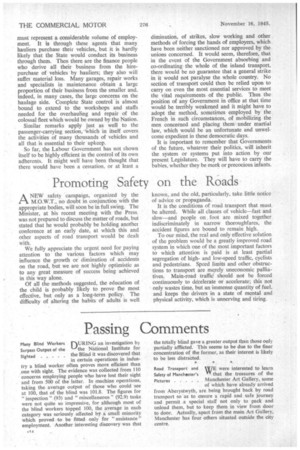A Fateful Decision T HE news of the extension of the
Page 15

Page 16

If you've noticed an error in this article please click here to report it so we can fix it.
life of the Road Haulage Organization of the Ministry of War Transport by at least 12 months from the date of the cessation of the war with Japan, came as something of a shock to many haulage people and others in the industry who were optimistic as to the result of the appeals which have been made for its termination. They had, apparently, based their belief upon the idea that the R.H.O., having been formed, ostensibly, as a war-time convenience, is no longer essential or advantageous in the days of peace.
We were by no means so convinced that the Government would be prepared to relinquish this form of control, which would obviously constitute such a convenient foundation for any scheme of nationalization of road haulage. This view was expressed by us several months ago, when the pros and cons of the case were under discussion throughout the industry.
Cabinet Thinking It Over Statements have been made in the general Press that the Labour Government's programme includes the submission of Bills to Parliament early in the New Year which will deal with the nationalization of, amongst other things, inland transport. On the other hand, a deputation comprising the chairman and vice-chairman of the R.H.A., and the chairmen of the Hired Vehicles and Controlled Undertakings Central Panels, which met the Minister last week, was informed that no final decision in this respect had yet been made by the Cabinet. At this meeting the views of the Association, both upon the question of the termination of control through the R.H.O., and the future of the industry, were clearly restated.
Further, the Minister said that he anticipated a decision on this momentous question being reached in the near future.
It will thus be seen how vital it is that the clear and comprehensive views of the whole industry, and particularly of the haulage branch, should be put forward at the earliest possible moment. There must be complete unity on this urgent matter, for State ownership of this one important section of our industry would undoubtedly have a reflex action upon many others, perhaps, in some cases, not immediately, but certainly in the future.
Obviously the whole problem is bound up with the question as to whether or not the railways will be taken over.
The State is a bad competitor. It does not appreciate, or agree with, rival interests in any field in which it holds sway. It can hardly be expected, therefore, that the Government would agree to privately owned road haulage remaining in competition with State railways and the haulage interests which would go with the latter. Therefore, at least in this instance, rail and road should co-ordinate their efforts and form a united front. The other interests concerned should also add their strength to the defence.
Many people, at any rate in the haulage field, have copied the reputed habit of the ostrich. A few have hopefully assured us that nationalization could not take place for a number of years—some say two, others even more. We are afraid that these people are holding to false hopes. It might, of course, take a long time to make the detailed arrangerhents for State ownership, but there is little or nothing to prevent the vital decision being taken and carried into effect at a comparatively early date. Once taken, such a step would be, to all intents and purposes, final, and any protest made afterwards would be virtually useless.
Stage a Great Demonstration We would like to see far more energy and initiative displayed in this fight for freedom. Why could not a great protest demonstration be staged at, say, the Albert Hall? Such an expression of the views of the industry would, we are sure, be supported by a large proportion of the representatives of the trade and industry of this country, as well as by many others who would be materially affected by the abolition of that personal interest in their well-being which is one of the great factors in the amicable relationship between the haulier and his customer.
As to the effects_ of nationalization upon other sections of our industry, consider the case of dealers in comthercial vehicles. There are said to be some 20,000 of these, who, with their staffs, must represent a considerable volume of employment. It is through these agents that many hauliers purchase their vehicles, but it is hardly likely that the State would conduct its business through them. Then there are the finance people who derive all their business from the hirepurchase of vehicles by hauliers; they also will suffer material loss. Many garages, repair works and specialists in maintenance obtain a large proportion of their business from the smaller and, indeed, in many cases, the large concerns on the haulage side. Complete State control is almost bound to extend to the workshops and staffs needed for the overhauling and repair of the colossal fleet which would be owned by the Nation.
Similar remarks apply just as well to the passenger-carrying section, `which in itself covers the activities of many thousands of vehicles and all that is essential to their upkeep.
So far, the Labour Government has not shown itself to be highly efficient in the control of its own adherents. It might well have been thought that there would have been a cessation, or at least a diminution, of strikes, slow working and other methods of forcing the hands of employers, which have been neither sanctioned nor approved by the unions concerned. It would seem, therefore, that in the event of the Government absorbing and co-ordinating the whole of the inland transport, there would be no guarantee that a general strike in it would not paralyse the whole country. No section of transport could then be relied upon to carry on even the most essential services to meet the vital requirements of the public. Thus the position of any Government in office at that time would be terribly weakened and it might have to adopt the method, sometimes employed by the French in such circumstances, of mobilizing the men concerned and placing them under martial law, which would be an unfortunate and unwelcome expedient in these democratic days.
It is important to remember that Governments of the future, whatever their politics, will inherit the system or systems put into action by our present Legislature. They will have to carry the babies, whether they be meek or precocious infants.




















































